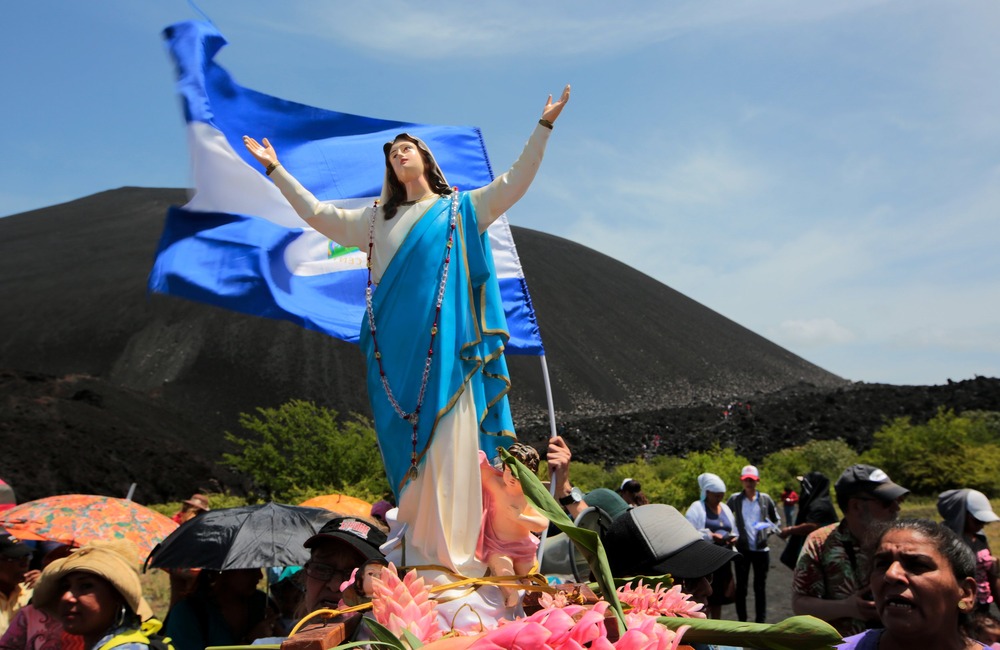
Nicaraguans carry a statue of Mary during an Aug. 14, 2018, pilgrimage in Leon to demand an end to violence in the country. Aug. 15 is the feast of the Assumption of Mary. (CNS/Oswaldo Rivas, Reuters)
The Nicaraguan government closed the country's most prominent Catholic radio station as the Sandinista regime continues to persecute the church and increasingly infringe on citizens' religious freedom and the ability to worship.
On July 9, Nicaragua’s interior ministry extinguished the legal status of Radio María, which broadcast Catholic content throughout the Central American country. It served as an important medium for Catholics lacking celebrations of the Eucharist after their priests fled the country to avoid persecution or were forced into exile.
The interior ministry claimed Radio María failed to deliver financial reports between 2019 and 2023 and alleged its board’s term expired in 2021. Eleven other nongovernmental organizations also had their legal status revoked the same day.
Radio María Nicaragua had operated in Nicaragua since 2000 and belonged to the World Family of Radio María operating in 84 countries.
More than 3,000 nonprofit organizations in Nicaragua have been stripped of their legal status in recent years, including the Missionaries of Charity for supposed irregularities and having too many foreigners on its board of trustees.
The closure of Radio María culminated a campaign of harassment from the ruling Sandinista regime. Its bank accounts were frozen in April, and the station had been broadcasting a limited schedule, though it was live online 24 hours a day. Radio María avoided controversial content by only broadcasting Mass and prayers, lawyer Martha Patricia Molina, who documents attacks on the Nicaraguan Catholic Church from exile, told the independent newspaper Confidencial.
The announcement followed broadcasts of Vice President Rosario Murillo — who has called Catholic priests "coup mongers" and "terrorists" — giving speeches on Radio María.
"The closure was the story of a death foretold, of simply leaving the people without access to media that has nothing to do with official propaganda," Molina said to Confidencial.
She accused the regime of "financially asphyxiating" Radio María.
Advertisement
The closure capped the latest chapter in Sandinista regime's suppression of Catholic voices in the country, which has tumbled toward totalitarianism as no dissent is tolerated, priests are spied upon and monitored during Mass, and public religious celebrations such as processions and feast days are prohibited.
Confidencial has counted at least 16 Catholic media outlets closed in the country, where Molina said, "The dictatorship intends to completely annihilate evangelization and the word of God, because they know that they are creating awareness in the population."
"This Christian evangelization is what the Nicaraguan regime wants to prevent in the country, persecuting the Catholic Church and closing almost all of its means of communication," wrote independent Nicaraguan media outlet La Prensa, which operates from outside Nicaragua.
At least 131 churchmen and 91 women religious have fled or been exiled from Nicaragua since 2018, Molina said in April. Bishop Rolando Álvarez of Matagalpa was exiled with 17 fellow churchmen to the Vatican in January after being convicted on spurious charges of conspiracy and spreading false information.
He was arrested in August 2022 after police raided his diocesan curia, where he was protesting the closure of Catholic radio stations.
Priests continue fleeing the country, according to Molina. The regime also routinely denies priests reentry into Nicaragua after traveling abroad.
Father Rodolfo French, an Indigenous Miskito priest ministering along Nicaragua's remote Caribbean Coast, received a message from the airline telling him that the Nicaraguan immigration authorities would deny him entry into the country, a source told OSV News. French remains in the United States, where he has been participating in missionary work.








